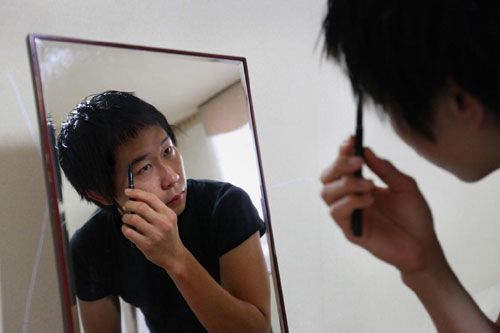|
 In this Sunday, Aug. 26, 2012 photo, Cho Won-Hyuk, a 24-year-old college student, uses a black eyebrow pencil to lengthen and accentuate his eyebrows at his home Anyang, South Korea. Cho's meticulous efforts to paint the perfect face are not unusual in South Korea. This socially conservative, male-dominated country, with a mandatory two-year military conscription for men, has become the male makeup capital of the world. |
|
Cho Won-hyuk stands in front of his bedroom mirror and spreads dollops of yellow-brown makeup over his forehead, nose, chin and cheeks until his skin is flawless. Then he goes to work with a black pencil, highlighting his eyebrows until they're thicker, bolder. "Having a clean, neat face makes you look sophisticated and creates an image that you can handle yourself well," the 24-year-old college student said. "Your appearance matters, so when I wear makeup on special occasions, it makes me more confident." Cho's meticulous efforts to paint the perfect face are not unusual in South Korea. This socially conservative, male-dominated country, with a mandatory two-year military conscription for men, has become the male makeup capital of the world. South Korean men spent $495.5 million on skincare last year, accounting for nearly 21 percent of global sales, according to global market research firm Euromonitor International. That makes it the largest market for men's skincare in the world, even though there are only about 19 million men in South Korea. Amorepacific, South Korea's biggest cosmetics company, estimates the total sales of men's cosmetics in South Korea this year will be more than $885 million. The metamorphosis of South Korean men from macho to makeup over the last decade or so can be partly explained by fierce competition for jobs, advancement and romance in a society where, as a popular catchphrase puts it, "appearance is power." Women also have a growing expectation that men will take the time and effort to pamper their skin. Evidence of this new direction in South Korean masculinity is easy to find. In a crowded Seoul cafe, a young woman takes some lipstick out of her purse and casually applies it to her male companion's lips as they talk. At an upscale apartment building, a male security guard watches the lobby from behind a layer of makeup. Korean Air holds annual male makeup classes for its staff at Incheon International Airport. "I can understand why girls don't like to go outside without makeup — it makes a big difference," said Cho Gil-nam, a tall,stocky 27-year-old insurance fraud investigator in Seoul who starts important days by dabbing on makeup after finishing his multistep morning cleansing and moisturizing routine. He carries a multicolored cosmetics pouch so he can touch up in public bathrooms throughout the day. (Read by Rosie Tuck. Rosie Tuck is a journalist at the China Daily Website.) (Agencies) |
赵元赫站在自己卧室的镜子前,将一团团黄棕色的粉底均匀地涂抹在他的额头、鼻子、下巴和脸颊上,直到自己的皮肤看上去没有瑕疵。接着他用一只黑色的眉笔把自己的眉毛画得更粗、更黑。 这位24岁的大学生说:“有一张干净、整洁的脸会让你显得老练,给人一种你可以掌控自己的感觉。你的形象很重要,所以在出席特别场合时化妆,这会让我更自信。” 像赵元赫这样精心化妆打造完美脸蛋的男人在韩国并不罕见。在这个社会观念保守的男权国家,男人要强制服两年兵役,如今这个国家已经成了世界男性化妆之都。 根据全球市场调查机构欧睿信息咨询公司的数据,韩国男性去年在皮肤护理上花费4.955亿美元,占全球男士护肤品销售额的近21%。这让韩国成为世界上男性护肤用品最大的消费市场,尽管韩国只有1900万名男性。韩国最大的化妆品公司爱茉莉的男士化妆品今年在韩国的总销售额估计将突破8.85亿美元。 韩国男性在过去十年里从大男子蜕变成脂粉男,一部分原因可能是在求职、晋升和情场竞争都很激烈的一个社会,就如一句流行语说的那样:外表就是力量。女性也越来越多地期望男性可以花些时间和精力来保养他们的皮肤。 韩国男性特点的这一新趋势很容易就能找到证据。在首尔的一个人头攒动的咖啡厅,一个年轻女子从手提包里掏出一支唇膏,一边和她的男伴聊天一边很自然地把唇膏涂在男伴的嘴唇上。在高端公寓,男保安脸上也都施以脂粉。大韩航空公司每年都会在仁川国际机场给职工开男性化妆课。 首尔一名27岁的保险欺诈调查员赵吉南说:“我能理解为什么女孩子不愿意不化妆就出门——化完妆确实会有很大变化。”又高又壮的赵吉南在每个重要的日子开始时,在完成清晨洁面和保湿的多个步骤后,都会涂上粉底。他随身带着一个彩妆包,这样他可以随时在公共卫生间里补妆。 相关阅读 (中国日报网英语点津 陈丹妮 编辑:Julie) |
|
Vocabulary: dollop: 团 conscription: 征兵 metamorphosis: 质变 catchphrase: 标语;警句 upscale: 高档的 stocky: 健壮结实的 dab: 轻拍 touch up: 润色 |
